Samsung Galaxy S 5 Review
by Anand Lal Shimpi & Joshua Ho on April 8, 2014 12:00 AM EST- Posted in
- Smartphones
- Samsung
- Mobile
- Galaxy S 5
CPU Performance
The Galaxy S 5 marks the second Snapdragon 801 based device we've reviewed at AnandTech, the first being HTC's M8. I've gone through the Snapdragon 801 in depth already, but we're basically dealing with a reasonable upgrade to Snapdragon 800 on an improved 28nm HPm process. The bulk of the improvements impact GPU and ISP performance, but the SoC is just better overall. GS5 owners are lucky as all versions of the device that use Qualcomm silicon feature the MSM8974AC v3 SKU, which includes four 2.5GHz Krait 400 cores and a 578MHz Adreno 330 GPU.
| Snapdragon 800/801 Breakdown | ||||||||||
| SoC Version | Model | Max CPU Frequency | Max GPU Frequency | ISP | eMMC | DSDA | Memory IF | |||
| MSM8974VV | v2 | S800 | 2.2GHz | 450MHz | 320MHz | 4.5 | N | 800MHz | ||
| MSM8974AA | v2 | S800 | 2.3GHz | 450MHz | 320MHz | 4.5 | N | 800MHz | ||
| MSM8974AB | v2 | S800 | 2.3GHz | 550MHz | 320MHz | 4.5 | N | 933MHz | ||
| MSM8974AA | v3 | S801 | 2.3GHz | 450MHz | 320MHz | 5.0 | Y | 800MHz | ||
| MSM8974AB | v3 | S801 | 2.3GHz | 578MHz | 465MHz | 5.0 | Y | 933MHz | ||
| MSM8974AC | v3 | S801 | 2.5GHz | 578MHz | 465MHz | 5.0 | Y | 933MHz | ||
Although Samsung was the first major OEM to be caught cheating in Android benchmarks, it appears to have completely abandoned the practice with the Galaxy S 5's shipping software. Not only was I unable to find any evidence of the old cheats, I couldn't find any evidence of HTC's new subtle cheating either. The Galaxy S 5 appears to be clean as far as I can tell. Kudos to Samsung on doing the right thing, and I hope all other OEMs take this as a sign to stop the silliness.
For our performance tests I turned to our usual suite of browser and native applications. If there's one obvious takeaway from our CPU tests it's that despite having faster silicon than HTC's M8, the GS5 isn't always faster. I believe this has more to do with thermals than anything else. HTC's metal chassis is able to do a better job of dissipating heat than the GS5's plastic chassis. I don't believe there's a substantial impact on user experience, but it's interesting to note how choice in materials can have a performance impact like this.
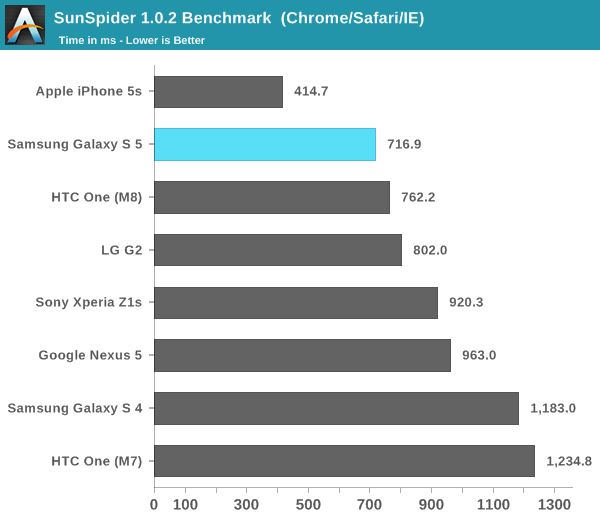
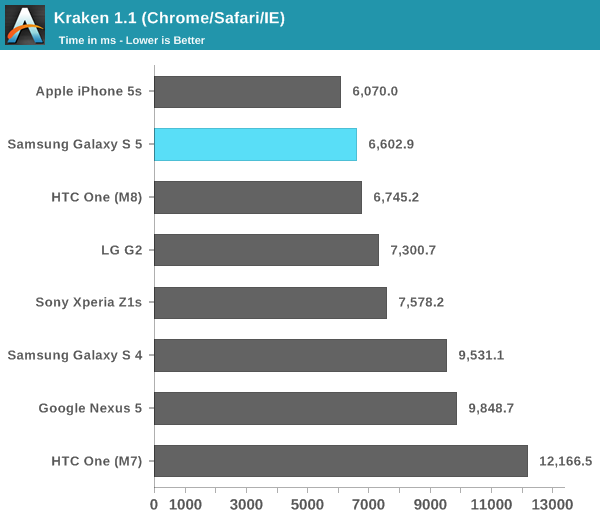
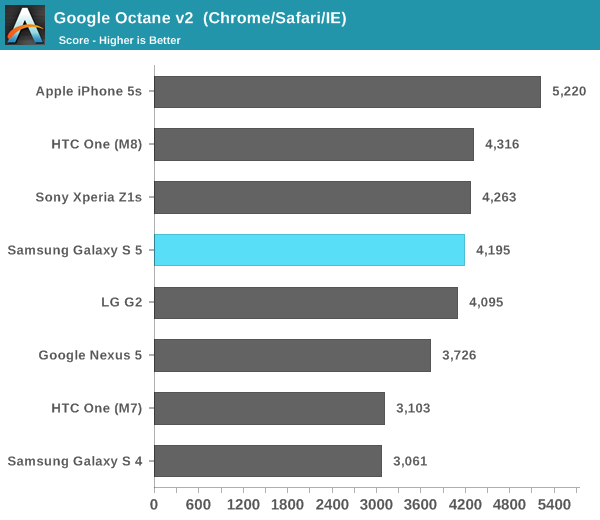
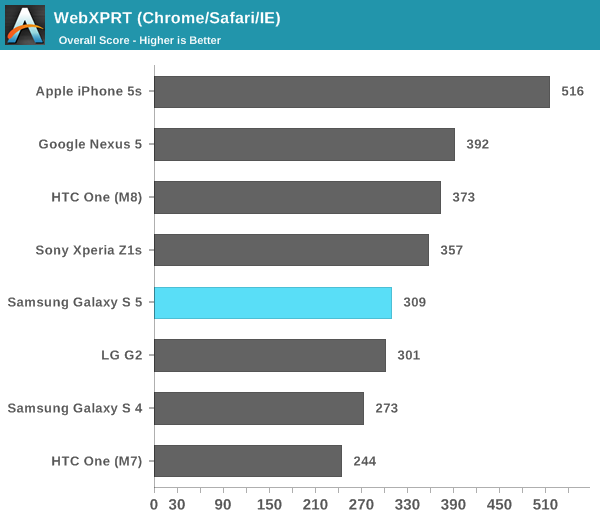
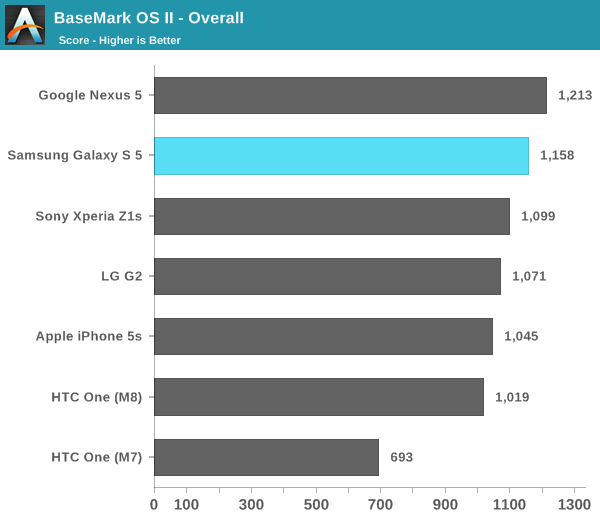
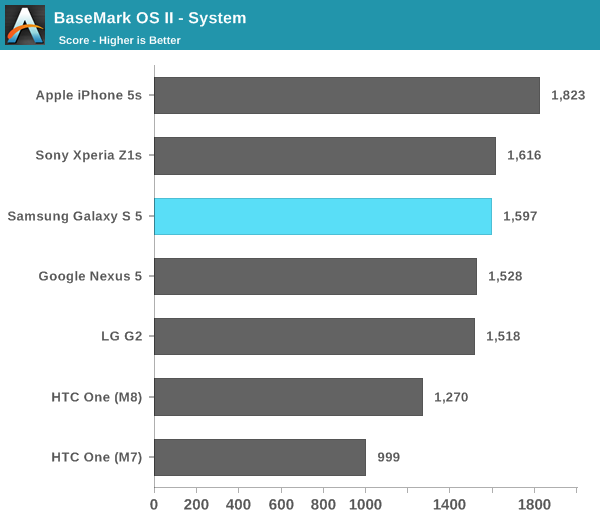
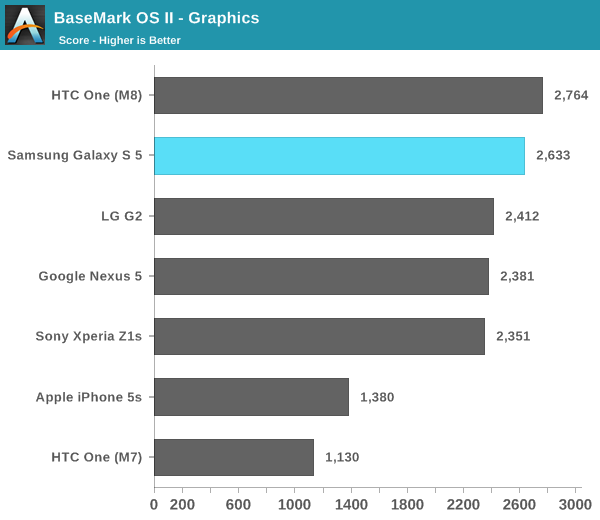
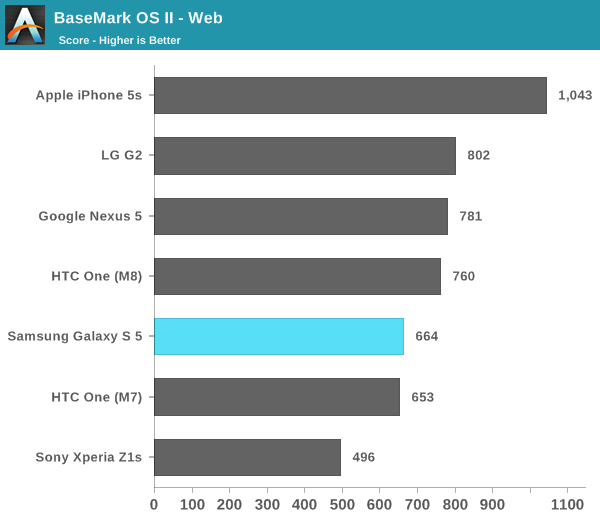
GPU Performance
GPU performance remains where we see the biggest benefit from Snapdragon 801 vs. 800, and since the GPU gains are almost entirely due to frequency scaling it's not too surprising that the M8 pulls ahead of the GS5 here in most cases.
There aren't any surprises here. The Adreno 330 in the Galaxy S 5 is more than capable of driving the device's 1080p display both in current and near term future 3D games.
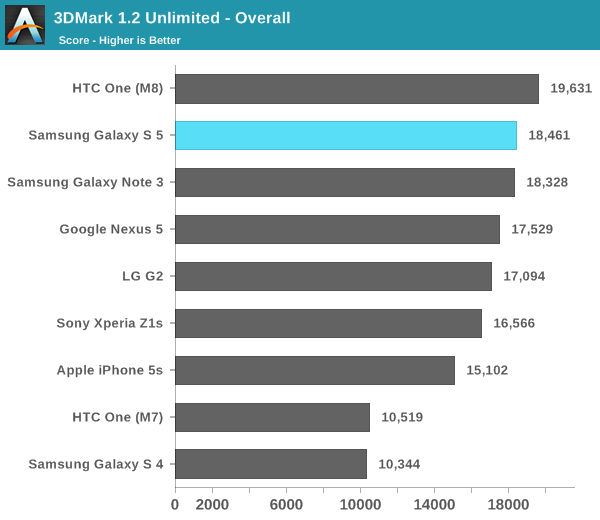
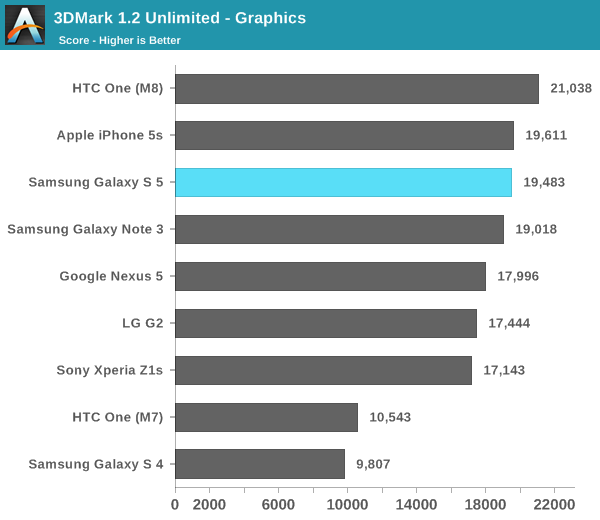
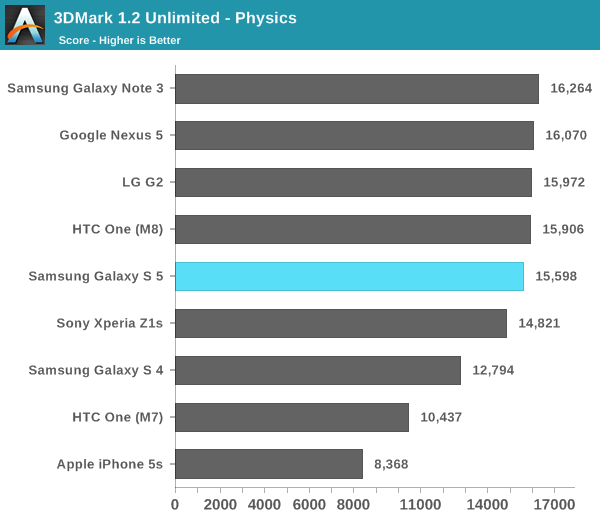
BaseMark X 1.1
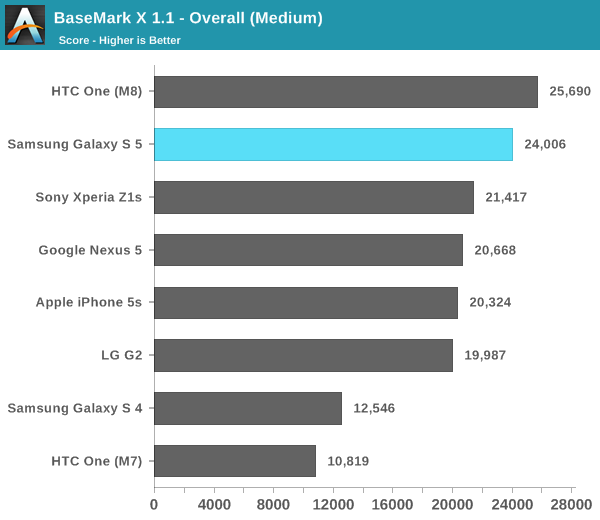
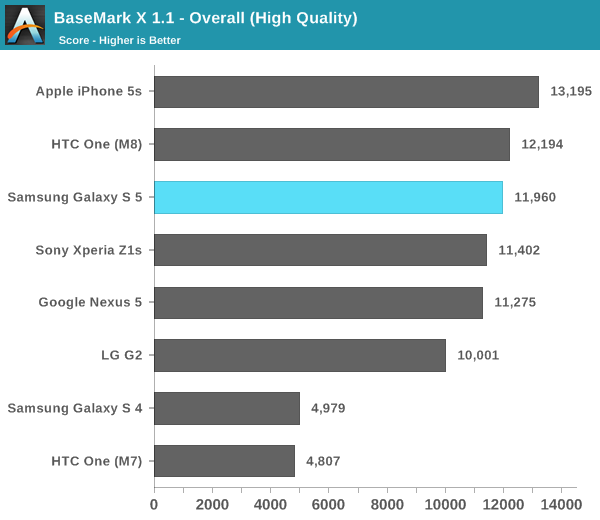
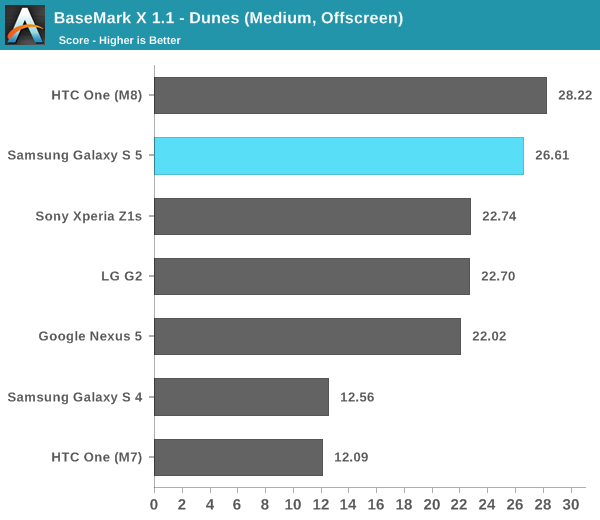
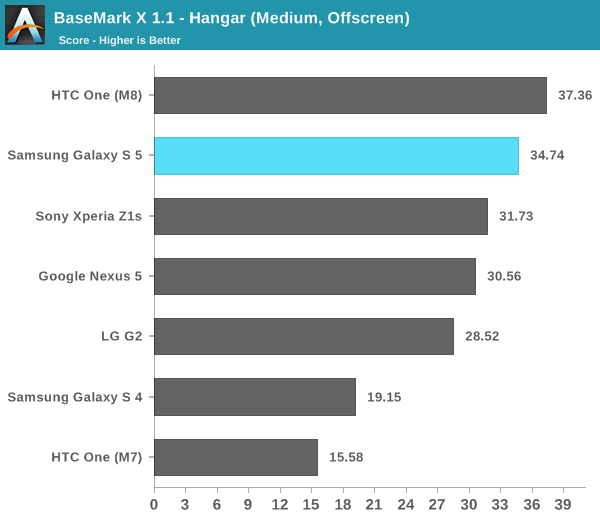
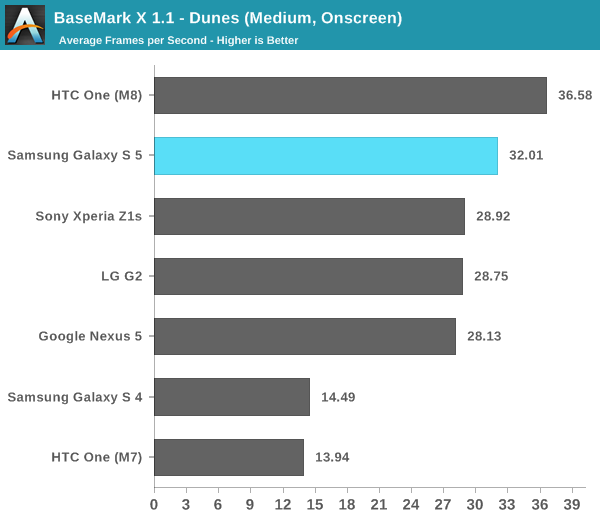
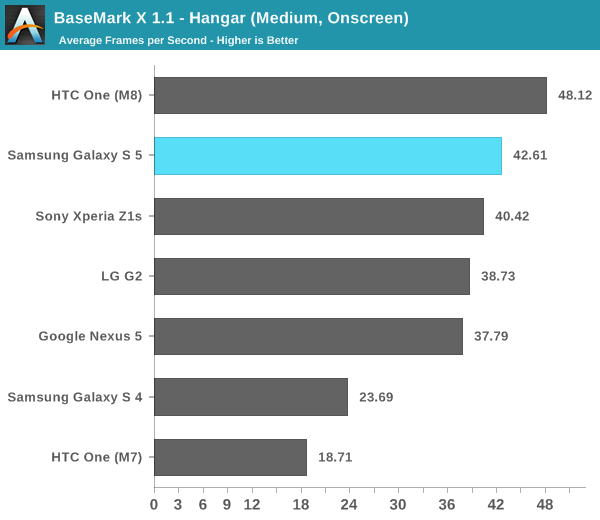
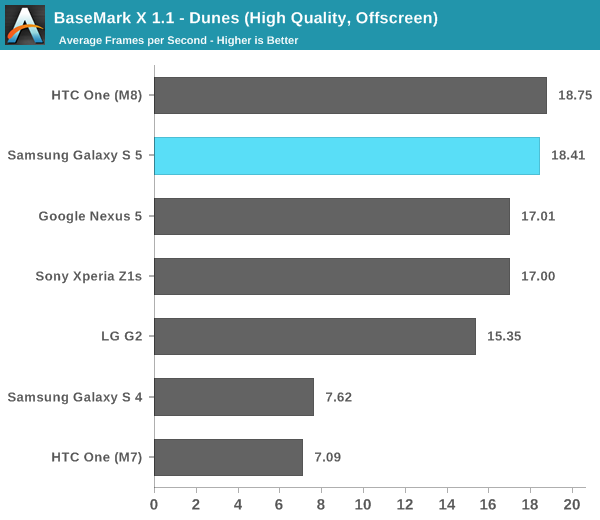
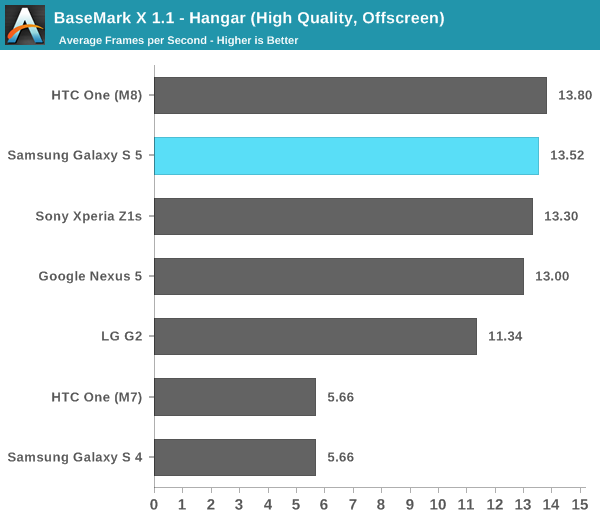
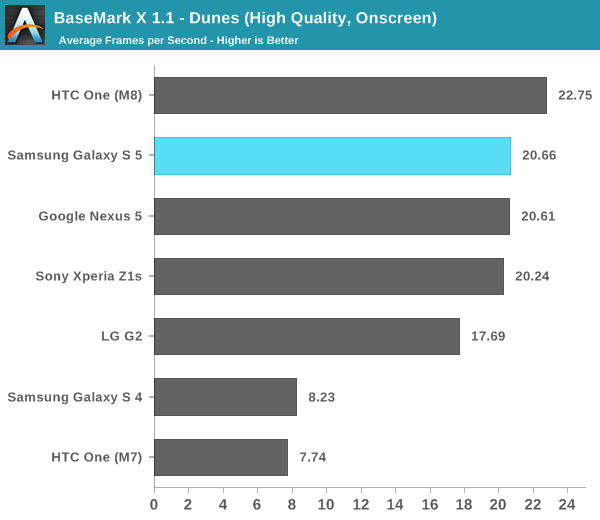
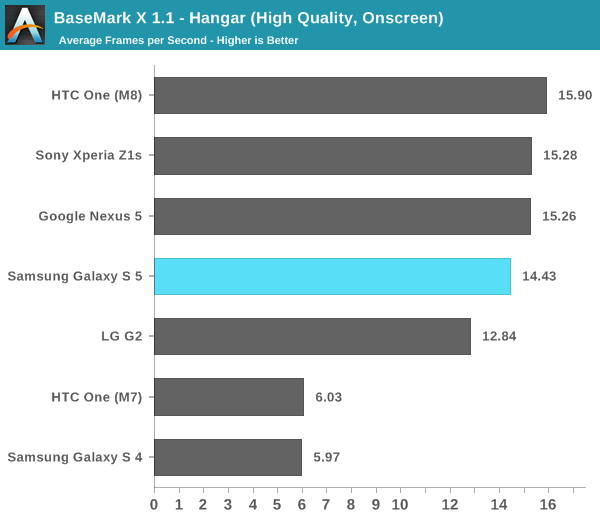
GFXBench 3.0
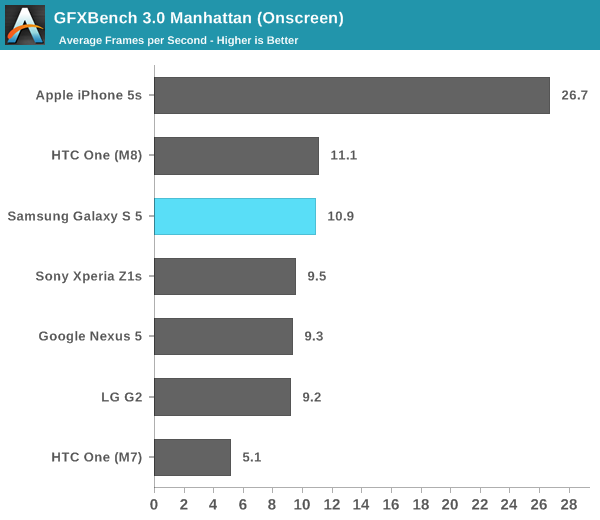
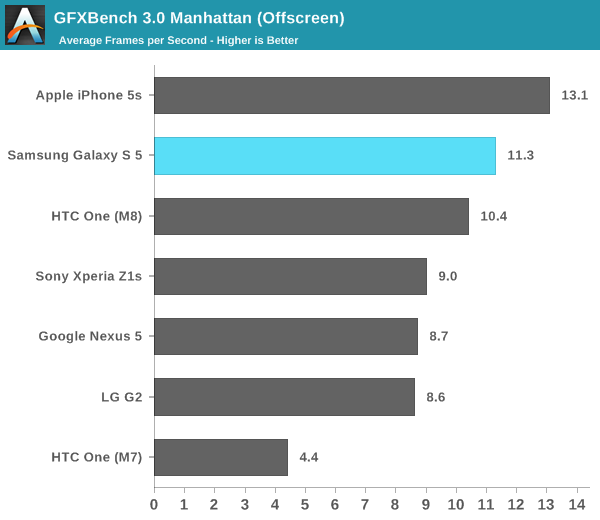
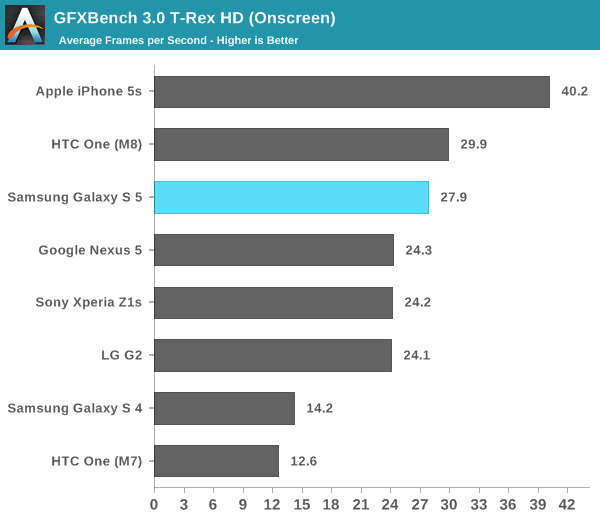
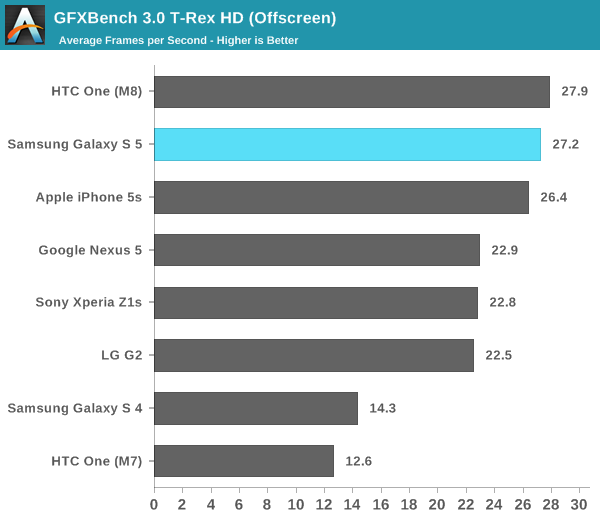
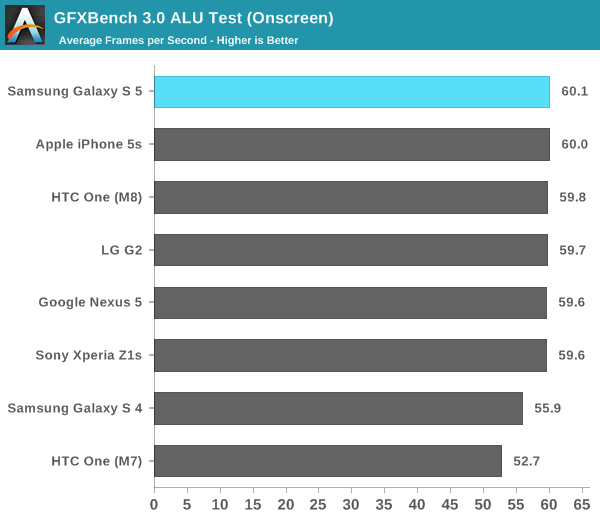
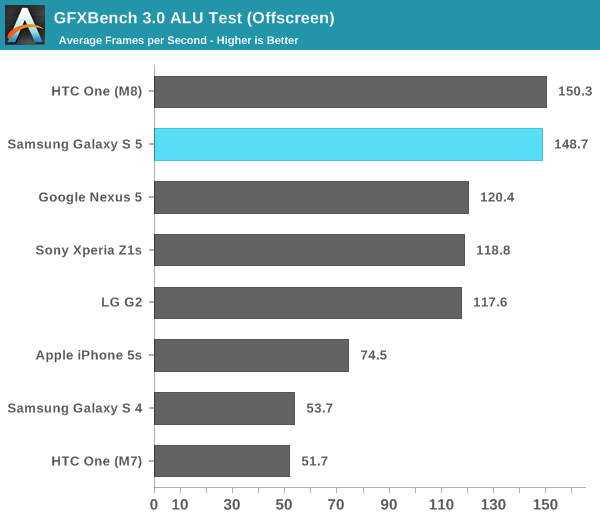
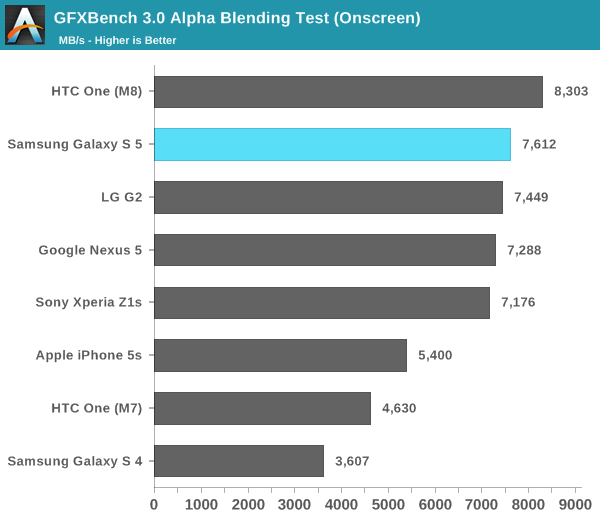
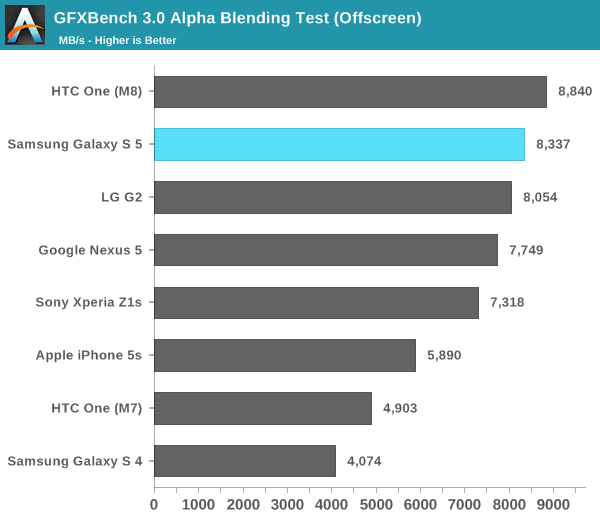
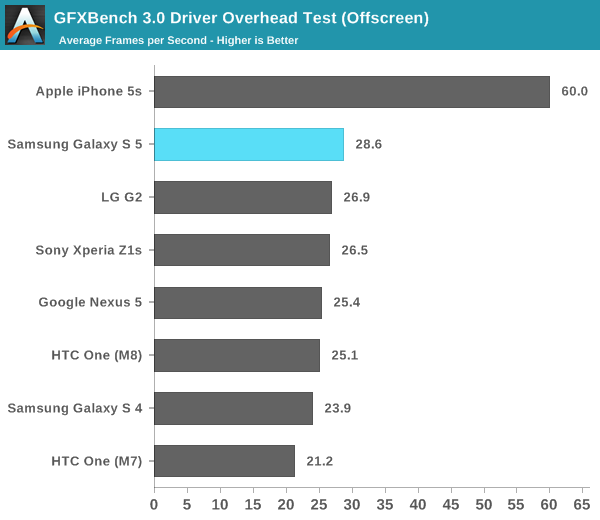
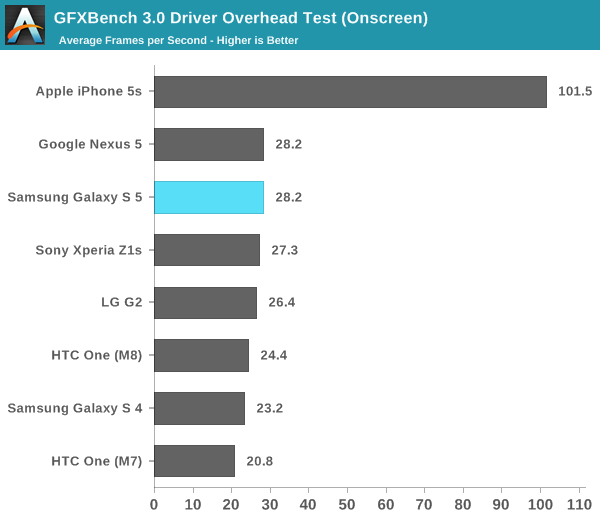
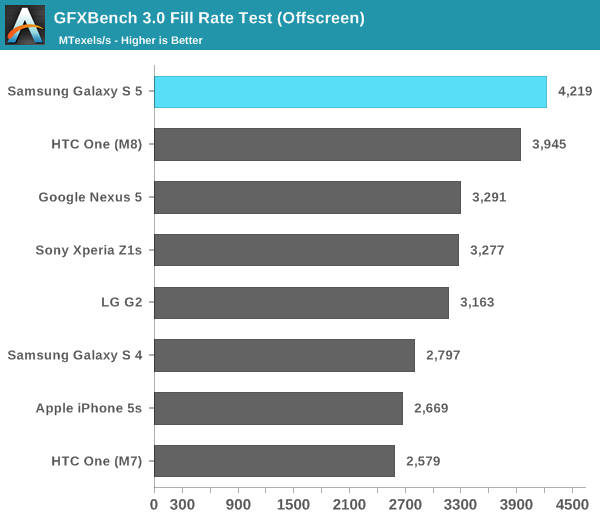
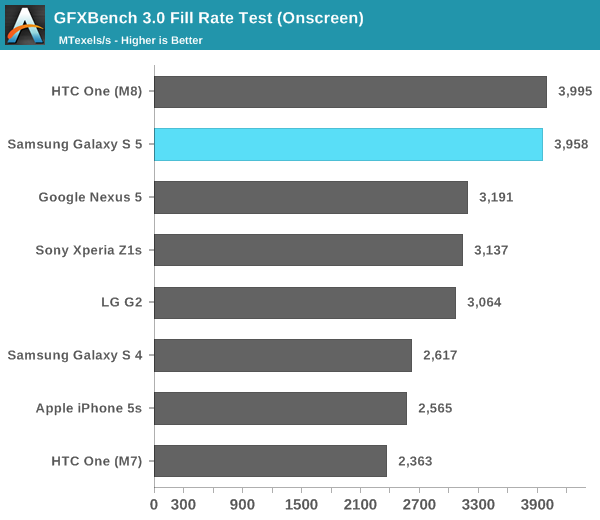
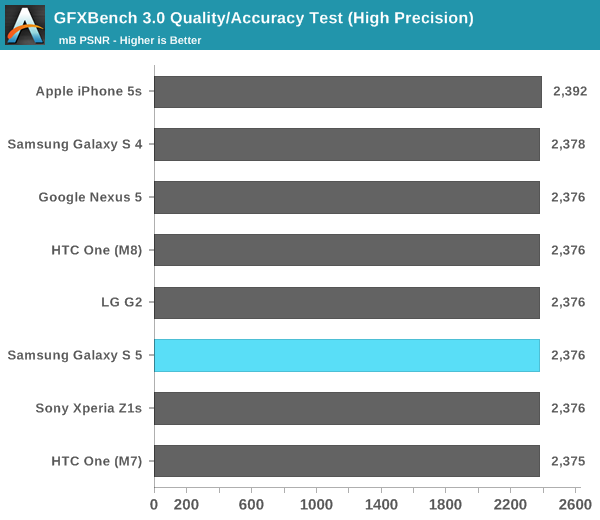
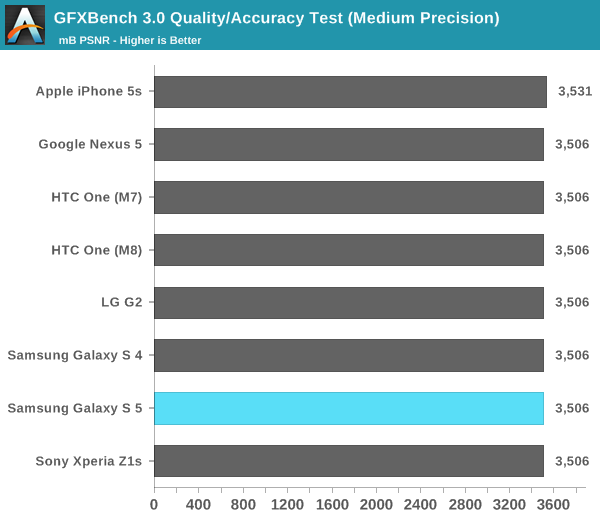
NAND Performance
The GS5 ships with 16GB or 32GB of NAND internally on an integrated eMMC device. Expansion is supported through a microSD card slot behind the removable back cover. Although the Snapdragon 801 inside supports eMMC 5.0, that alone doesn't guarantee a substantial increase in NAND performance. Keep in mind that most OEMs find multiple sources for their internal eMMC/NAND solutions, so what I'm testing here may only be representative of a portion of all GS5 devices.
Samsung sampled a 16GB GS5 review device. I put it through our usual random/sequential IO tests on a 100MB span of LBAs.
Random read performance is disappointing, it falls behind all modern devices we've tested. Random write performance is middle-of-the-road at best. It's unclear to me if this is a cost optimization or a lack of concern for NAND performance, but either way I'd rather see these metrics improve rather than regress.

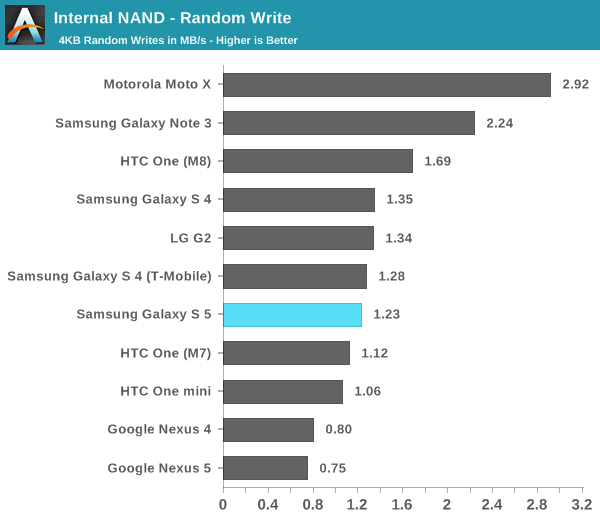
Sequential read/write performance both improve handsomely compared to the Galaxy S 4. I can see why Samsung would want to optimize for these two cases as they are quite common in regular usage, but random read/write performance can also significantly impact user experience.
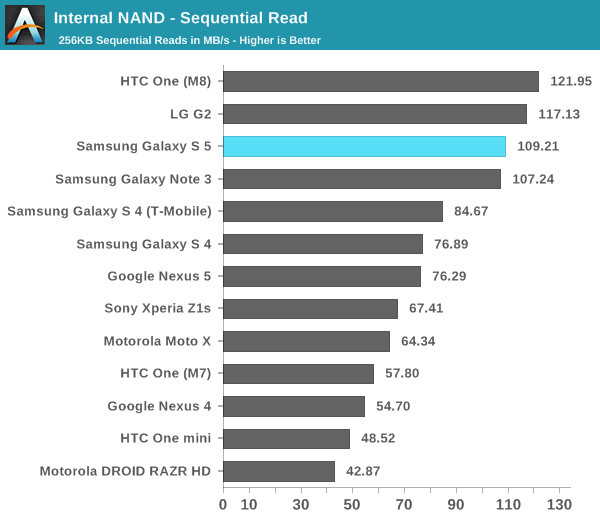
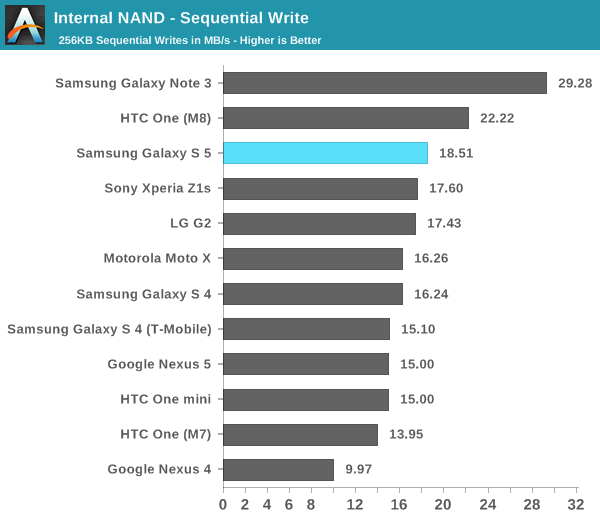










296 Comments
View All Comments
ESC2000 - Sunday, April 13, 2014 - link
I would be an incredibly shortsighted business plan to purposely create a laggy UI and hope it makes people upgrade... It will make them upgrade... To a competitor's phone. If the lag was your problem with the device, why would you but another device that very well might be laggy as well?StevenSMay - Wednesday, April 9, 2014 - link
The reason why manufacturers drop those skins is not so they "look different" only but because they can somehow rationalize not updating the software on the device later and force you into an upgraded device sooner. http://qr.net/stx3SpeedsterRadio - Wednesday, April 9, 2014 - link
No comments about radiated sensitivity in the two wifi bands, nor in Cellular, PCS, or AWS bands. This review is somewhat pointless.. If someone buys this device and it has weak RF performance, they're not going to be happy with any of the features (esp. download booster) if connectivity is horrible due to poor antenna design.TheSailorMan - Wednesday, April 9, 2014 - link
He told you that it works great. What else you want? To tell you that iphone5s is the best device???(or M8?)He couldn't say it strait(cause he pretend not be biased) , but hinted it many times. And he even said here that the ALUMINUM is great and very important feature for him(as "tech guru" he should know that aluminum is the WORST material for smartphones, though).
Besides he did "great job" already, to play-down all the great features that S5 has.
nerd1 - Wednesday, April 9, 2014 - link
Maybe it's just me, but I now think anand now very carefully selects test results that makes apple devices look better, while pretending to be unbiased.Stock browser beats iPhone 5 with sunspider (slower chrome was used instead). AMOLED screen sucks at web browsing and excels at movie playing and there is no movie playing battery benchmark. Display brightness is shown with manual brightness (which is capped).
And again the "plastic is bad" conclusion - I absolutely HATE phone case and always carry tiny backup battery. Why he keep saying that mobile devices should be made in metal? Metal gets scratched and bent, is heavier and slippery so everyone puts case over it - then WHY?
doobydoo - Friday, April 11, 2014 - link
No, it's not just you. Any Samsung fanboys in denail will agree with you.doobydoo - Friday, April 11, 2014 - link
denial*Streamlined - Thursday, April 17, 2014 - link
If you're in the market for an Android phone you don't give a crap about Apple. What you want is to be able to compare Android phones against one another. So Anand picks a neutral browser to allow a good comparison.omaudio - Wednesday, April 9, 2014 - link
PLEASE add to your phone reviews whether the GPS functions work when the phone is in airplane mode or out of cellular range. I use my HTC Amaze for camping and other off the grid trips and do so because the GPS works with my offline maps etc.az06093 - Friday, April 11, 2014 - link
There are 3 options for the GPS on android devices. GPS only, network assisted gps, and network location only. Just set it to gps only.